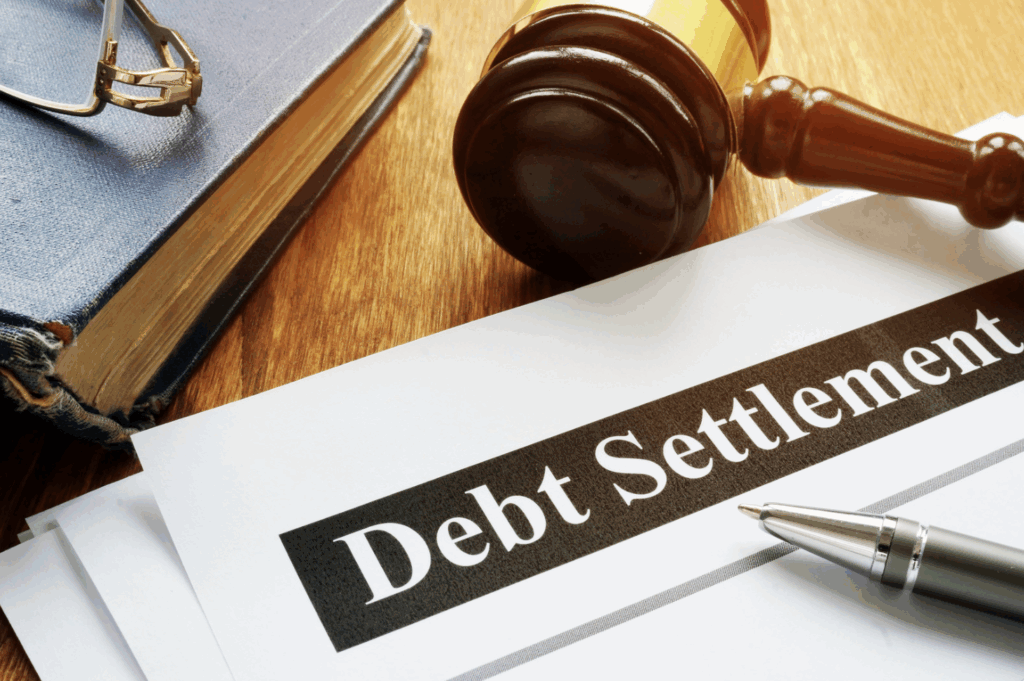If you’re overwhelmed with your credit card debt and you’ve exhausted your traditional repayment options, you may decide to consider either debt settlement or bankruptcy. Both of these debt relief options can alleviate some of the financial pressure your debt has caused and provide you with a fresh start to move forward.
Debt settlement and bankruptcy each offer unique advantages and risks, and it’s important to consider both the short and long-term effects of each option. Let’s walk through how each option works, its pros and cons, and the best option for your situation.
Understanding Credit Card Settlement
What Is Credit Card Settlement?
Credit card settlement is the process of negotiating with your credit card company to pay less than the full balance on your debt. When you settle your debt, your credit card issuer may agree to accept less than the full amount you owe in exchange for either one lump-sum payment or a series of installment payments.
Successful debt settlement often requires stopping payments on your credit cards. Your lender may have more incentive to settle your debt, and you may be able to settle for as much as 50% of your debt amount.
Debt settlement may be a good choice if you’re unable to pay your debt as it is today. While it often has a negative effect on your credit, especially if you have to go into default on your credit card accounts, it gets you out of debt faster and for less money.
Pros of Credit Card Settlement
- Reduced debt payoff: You’ll be able to become debt-free quicker and for less than your full debt balance.
- Avoids bankruptcy filing: Negotiating a debt settlement could help you avoid more drastic measures like filing for bankruptcy.
- May allow faster financial recovery: Debt settlement typically has less of a long-term impact on your credit than bankruptcy, allowing you to recover more quickly.
- End debt collection: Once your debt settlement is final, you won’t have to worry about collection calls and letters from your creditors.
Cons of Credit Card Settlement
- Potentially high fees: Debt settlement companies often charge high fees that reduce the amount you’re actually saving.
- Negative impact on credit: Because you often have to stop payment on your credit cards, debt settlement may impact your credit.
- Creditors may refuse to settle: There’s no assurance your credit card company will be on board with a settlement, and you could damage your credit without a successful settlement especially if it’s not approached correctly.
- Results in tax liability: The IRS requires you to pay taxes on your forgiven debt, which reduces the amount you’re actually saving although there may be ways to minimize this.
Exploring Bankruptcy
Definition and Types of Bankruptcy
Bankruptcy is a legal process that allows you to eliminate some or all of your debt. There are two types of bankruptcy, which work a bit differently:
- Chapter 7: This type of bankruptcy requires you to liquidate your assets to pay off your creditors. Any eligible debt that’s left after the liquidation is typically discharged. Certain assets, including retirement accounts, vehicles, and other personal items, are exempt from liquidation.
- Chapter 13: This type of bankruptcy, known as a wage earner’s plan, puts you on a payment plan for your debt over three to five years. Any debt that’s left at the end of the payment plan is discharged, and you don’t have to worry about your assets being liquidated.
Pros of Bankruptcy
- Full or partial debt discharge: Bankruptcy typically results in either some or all of your debt being discharged, serving as a fresh start to help you rebuild your finances.
- Automatic legal protection from creditors: Once you enter the bankruptcy process, your creditors are prevented from suing you and from making any other collection efforts.
- Some protection for your assets: Chapter 13 protects your assets from liquidation, while Chapter 7 protects certain exempt assets.
Cons of Bankruptcy
- Severe long-term credit impact: Bankruptcy stays on your credit report for between seven and 10 years and will limit your access to credit during that time.
- Potential loss of assets: Chapter 7 bankruptcy can result in having some of your assets liquidated to pay off your creditors.
- Stigma and public record: Bankruptcies are a part of public record, and many people are hesitant to file because of the stigma associated with it.
- Doesn’t apply to all debts: Bankruptcy doesn’t apply to secured debts, like mortgages or auto loans, and it doesn’t apply to most government debt or domestic obligations.
Comparing Credit Card Settlement and Bankruptcy
There’s a lot to consider when you’re choosing between credit card settlement and bankruptcy. Both options can be helpful for certain borrowers. Make sure to consider factors like the financial impact, credit score implications, timeframe, and legal protections.
Financial Impact
Both debt settlement and bankruptcy typically require some out-of-pocket costs, including debt settlement company fees, attorney fees, and filing fees. At the same time, you must also consider the potential savings. Debt settlement could help you save up to 50% of your debt, while bankruptcy could eliminate up to 100% of your debt.
Credit Score Implications
Both credit card settlement and bankruptcy can harm your credit, but to different extents. Debt settlement usually has a significant short-term credit impact. You usually must go into default on your credit card (if you aren’t already there), and it will take time to rebuild your credit. And while the default will remain on your credit report for some time, the impact will lessen over time.
Bankruptcy, on the other hand, has a much greater impact on your credit. It likely has a greater immediate impact than debt settlement and will continue to affect your borrowing options for at least several years and at times up to 10 years moving forward.
Timeframe
The amount of time it can take to complete these debt relief options varies from case to case. Debt settlement can take anywhere from months to years, depending on your situation. It can be a faster process than bankruptcy, but the fact that lenders don’t have to get on board creates some unpredictability.
Chapter 7 can be a relatively fast process. It’s over once your assets are liquidated and your debts are discharged. Chapter 13, on the other hand, takes three to five years and requires you to make monthly payments during that time. It takes a lot longer to get your fresh start.
Legal Protection
A key benefit of bankruptcy is the automatic stay, which prevents your creditors from suing you or trying to collect on your debt once you’ve started the filing process. Additionally, your debts are discharged by the court, which protects you from collection by your creditors.
Credit card settlement comes with far less protection. Lenders aren’t guaranteed to negotiate a settlement. It’s entirely possible to go through all the steps of stopping payments on your credit card accounts and then trying to negotiate, only to have your lender say no. There’s no level of legal protection until the debt settlement is finalized.
Factors to Consider When Deciding
If you’re weighing your options between credit card settlement and bankruptcy, here are some factors to consider in your own situation to help you decide.
- Total debt amount: Settlement may be a better option if you have a moderate amount of debt that’s difficult, but not impossible, to repay. However, if you have significant debt that you can’t repay, even if the amount is reduced, then bankruptcy may be a better fit.
- Income and financial stability: The type of bankruptcy you’re eligible for depends on your income situation, which may be a factor in your decision-making. Debt settlement may be a good option if you have enough income to pay a portion of the debt, as it can be resolved much more quickly than Chapter 13 bankruptcy. On the other hand, if you’re completely insolvent with little or no income, Chapter 7 bankruptcy is likely the better fit.
- Asset protection needs: Do you want to ensure your assets are protected? Chapter 7 bankruptcy might require you to liquidate some of your assets, while a credit card settlement won’t. However, only bankruptcy prevents your creditors from suing you to garnish your wages or bank account to repay your debt.
- Willingness to risk credit score: Both debt settlement and bankruptcy can hurt your credit. But bankruptcy is likely to have a larger and longer impact. If your goal is to repair your credit as quickly as possible, you should likely choose debt settlement.
- Long-term financial goals: Debt settlement can be more helpful in the short term because it has less of an impact on your credit. While bankruptcy has a greater immediate credit impact, it also clears your debt and can give you a fresh start, which can help you reach your long-term goals more easily.
- Time and cost considerations: Both debt settlement and bankruptcy have costs, and both can take months to years. A debt relief attorney can look at your specific situation and advise you on the estimated time and financial cost of each option.
Alternatives to Settlement and Bankruptcy
Debt settlement and bankruptcy aren’t right for everyone. These alternatives to bankruptcy and debt settlement can help you make your debt repayment more manageable with less impact on your credit.
Debt Refinancing and Consolidation
Debt refinancing and consolidation are two options to restructure your credit card debt to make it easier to repay. When you refinance your credit cards, you often take out a personal loan to repay your debt at a low, fixed interest rate. With less of your money going toward interest, you’re able to pay off your debt more quickly.
It’s also possible to refinance credit card debt using a balance transfer credit card that offers 0% APR for a certain period, often up to 18 or 21 months. However, this option will come with high interest charges if you don’t pay off the debt within the 0% APR period.
Debt consolidation is a similar concept to refinancing, but instead of refinancing just one debt, you’re refinancing multiple debts together. For example, you might consolidate multiple credit cards by taking out one personal loan to pay off all of your cards.
Credit Counseling Services
Credit counseling is a service that many non-profit organizations offer to help borrowers address their debt and credit issues. A key service they offer is a debt management plans (DMP). A DMP restructures your debt in a way that allows you to pay off your debt in three to five years.
The credit counselor negotiates with your credit card company on your behalf. They’ll try to lower your interest rate, waive fees, and make your debts more affordable. You’ll then make monthly payments to the credit counseling agency, which will distribute them to your creditors.
This option has some similarities to Chapter 13 bankruptcy, but without the debt discharge and the significant hit to your credit score.
Negotiating Directly with Creditors
You can negotiate with your creditors without necessarily settling your debt. Some lenders may be willing to lower your interest rate, waive fees you’ve accrued, or restructure your payment plan so your monthly payments are lower.
In the end, it’s in your lender’s best interests to ensure you can repay your loan. It costs them time, effort, and money to take legal action against you. They may be willing to budge on some of your credit card terms to ensure they’re paid.
Legal and Financial Guidance
Debt settlement and bankruptcy are both relatively complex measures and can impact your credit and overall personal finances. For that reason, you should consider seeking exerienced legal and/or financial guidance to help you through the process.
Why Consulting Professionals Is Critical
Bankruptcy is a legal process that requires a deep understanding and adherence to the laws. While it may seem more cost-effective to handle it yourself, it can ultimately end up costing you far more money, especially if you make a mistake.
Similarly, while debt settlement isn’t a legal process in the same way bankruptcy is, it can be complex and require specialized knowledge. Additionally, an experienced debt help professional who regularly negotiates with creditors is likely to get a better outcome than you could get on your own. Usually an attorney who practices this area of law is the best resource.
How a Debt Relief Attorney Can Help
Whether you’re considering credit card settlement or bankruptcy, a debt relief attorney can help. If you go the settlement route, a debt relief attorney can communicate and negotiate with your creditors on your behalf.
Thanks to their years of experience, they’re more likely to get you a successful settlement. And if the creditor won’t settle, a debt help lawyer can help you explore other debt relief options or, in the worst-case scenario, represent you in court if your lender sues you for your unpaid debt.
In the case of bankruptcy, an attorney is even more important. They can handle all of the paperwork and filing on your behalf, represent you in court, and protect as many of your assets as possible, helping to give you a true fresh start.
Conclusion
Debt settlement and bankruptcy are two ways to find relief for your credit card debt when you’ve been otherwise unable to repay it. Both come with pros and cons, and each one is best for a different type of borrower and situation.
If you’re wondering which option is right for you, a debt relief professional can take a close look at your financial situation and advise you on the best path for your financial future.
Tayne Law Group has a team including of debt relief attorneys with more than two decades of experience helping borrowers like you tackle their credit card debt. To find out more about your debt relief options and what working with an attorney looks like, contact our law offices by calling (866) 890-7337 or filling out our short contact form. We won’t share or sell your information. All conversations are confidential.




